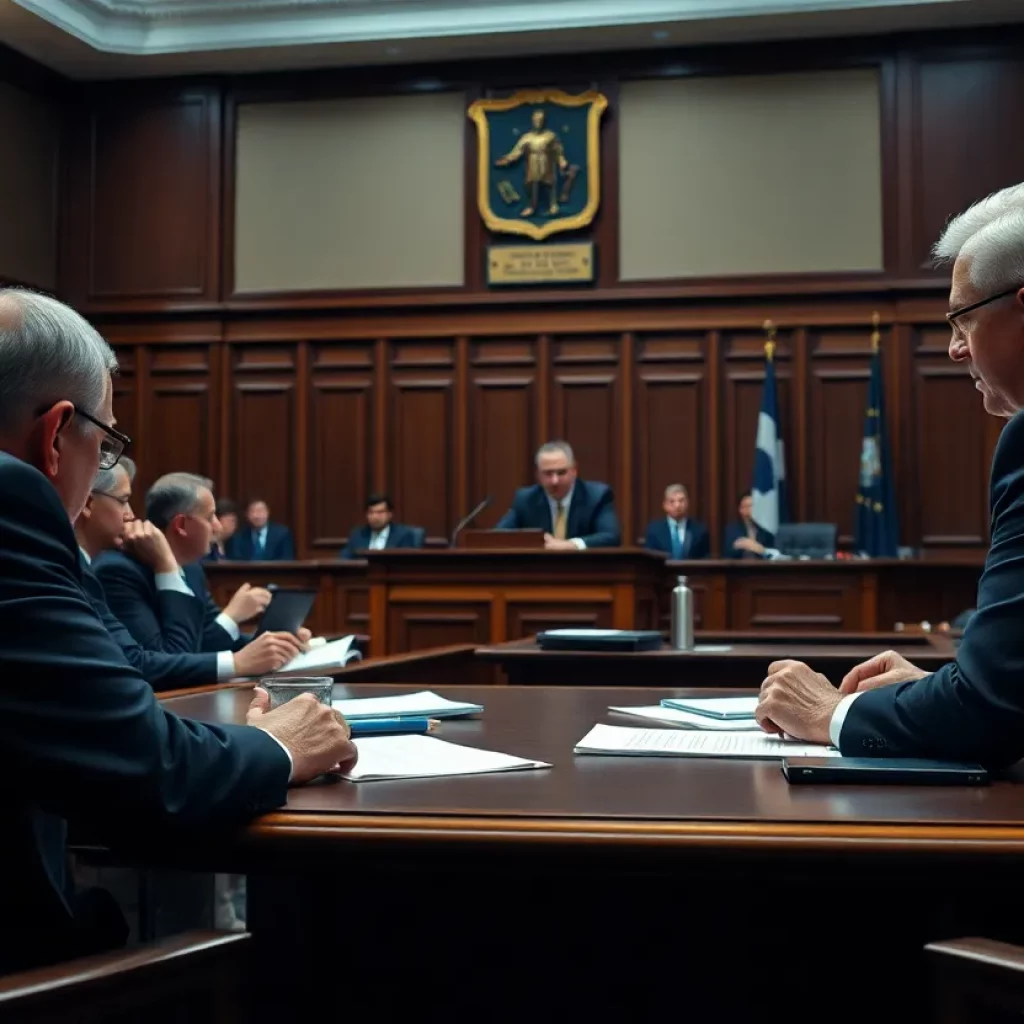News Summary
Mark Zuckerberg, CEO of Meta, testified for seven hours in a landmark antitrust trial examining the company’s acquisitions of Instagram and WhatsApp. The Federal Trade Commission argues these moves were aimed at stifling competition, a claim Zuckerberg contests by emphasizing the competitive environment of the tech industry. Revelations from internal communications further complicate the case, as the court evaluates whether these acquisitions were strategic or simply business growth decisions. The outcome of this trial could significantly affect Meta’s future and the broader tech landscape.
A Historic Antitrust Battle: Meta CEO Mark Zuckerberg Takes the Witness Stand
Opening Arguments
Mark Zuckerberg, the controversial CEO of Meta, finds himself embroiled in a landmark antitrust trial that commenced on April 14, 2025, at the Barrett Prettyman United States Court House in Washington D.C. The stakes couldn’t be higher, as the trial seeks to determine whether Meta’s acquisitions of Instagram and WhatsApp were maneuvers to stifle competition and establish a monopolistic grip on social media platforms.
Faced by the relentless Federal Trade Commission (FTC), represented by attorney Daniel Matheson, Zuckerberg is defended by Mark Hansen. As the proceedings unfold, the implications of this trial could alter the landscape of the tech industry as we know it.
Antitrust Concerns Surface
During a heated series of testimonies, fresh evidence has emerged in the form of an email dated from 2018, which suggests that Zuckerberg contemplated the separation of Instagram from Meta due to antitrust apprehensions. In the email, he expressed the possibility of being compelled to **spin out Instagram and WhatsApp** within five to ten years. This revelation adds a layer of complexity to the argument, as the court grapples with whether Meta’s acquisitions were indeed strategic moves to silence potential competitors or if they were simply part of routine company expansion.
Zuckerberg described Instagram as a rapidly growing platform that posed threats to their business, underscoring the importance of the acquisition not just for growth, but for survival in a competitive marketplace. The trial has become a battleground of contrasting narratives regarding the dynamics of competition in the tech industry.
The CEO’s Grilling
Zuckerberg took the stand for an exhaustive seven hours over two days, a session characterized by intense questioning from the FTC. Matheson did not shy away from probing into Zuckerberg’s past concerns about competition, leveraging emails discussed throughout the trial to challenge Zuckerberg’s portrayal of the Instagram acquisition as benign. In particular, a February 2012 email mentioning the disruptive potential of Instagram and other competitors was scrutinized, raising questions about Meta’s true motivations.
Under Hansen’s defense, Zuckerberg argued that Meta operates in a highly competitive environment, highlighting that the services offered by Facebook are free for users. He contended that implementing charges for the platform could prompt a mass exodus to competing services.
Divestment Looming?
As the trial progresses, the looming consequence of potentially having to divest from both Instagram and WhatsApp is a real concern for Meta. These acquisitions were made over a decade ago, with Instagram being bought for $1 billion in 2012 and WhatsApp for $22 billion in 2014. The question of whether these platforms can remain under Meta’s umbrella carries significant implications for the future of the company.
The FTC’s argument hinges on the assertion that the acquisitions were not merely business decisions but tactics to suppress competition. However, critics argue that the agency’s definition of competition is too narrow. Notably, the FTC excludes competitor platforms like TikTok and YouTube from its analysis, a decision that raises eyebrows among industry analysts.
Looking Ahead
As U.S. District Judge James Boasberg presides over this pivotal case, Meta’s hopes of a prompt resolution were dashed when the court denied their request for a summary judgment. With many eyes on this historical trial, the outcome could reshape the power dynamics within the tech industry and set a precedent for addressing monopolistic practices among tech giants.
Zuckerberg’s steadfast excitement about acquiring Instagram, claiming it would enhance Meta’s offerings, stands in contrast to the mounting evidence suggesting otherwise. As the trial continues, the courtroom drama unfolds, highlighting the complex web of big tech, competition, and regulation in an era where the rules of the game are rapidly being rewritten.
Legal experts and industry enthusiasts alike are keenly watching to see how this antitrust trial plays out, as its ramifications will undoubtedly reverberate through the tech landscape for years to come.
Deeper Dive: News & Info About This Topic
HERE Resources
Additional Resources
- Reuters
- Wikipedia: Antitrust
- Thomson Reuters
- Encyclopedia Britannica: Antitrust Law
- Google Search: Meta antitrust trial
Author: STAFF HERE CHARLESTON
The CHARLESTON STAFF WRITER represents the experienced team at HEREcharleston.com, your go-to source for actionable local news and information in Charleston, Charleston County, and beyond. Specializing in "news you can use," we cover essential topics like product reviews for personal and business needs, local business directories, politics, real estate trends, neighborhood insights, and state news affecting the area—with deep expertise drawn from years of dedicated reporting and strong community input, including local press releases and business updates. We deliver top reporting on high-value events such as the Spoleto Festival USA, Charleston Wine + Food Festival, and the MOJA Festival. Our coverage extends to key organizations like the Charleston Metro Chamber of Commerce and the Charleston Museum, plus leading businesses in tourism and maritime industries that power the local economy such as South Carolina Ports Authority and the Charleston Visitor Center. As part of the broader HERE network, including HEREaiken.com, HEREbeaufort.com, HEREchapin.com, HEREcharleston.com, HEREclinton.com, HEREcolumbia.com, HEREgeorgetown.com, HEREgreenwood.com, HEREgreenville.com, HEREhiltonhead.com, HEREirmo.com, HEREmyrtlebeach.com, HEREnewberry.com, HERErockhill.com, HEREspartanburg.com, HEREaustin.com, HEREcollegestation.com, HEREdallas.com, HEREhouston.com, and HEREsanantonio.com, we provide comprehensive, credible insights into South Carolina's dynamic landscape.










